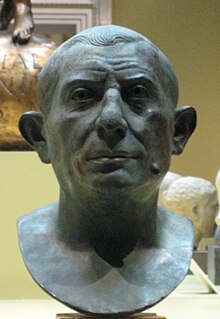Lucius Caecilius Iucundus
| Lucius Caecilius Iucundus | |
|---|---|
 |
|
| Born | 14 AD |
| Died | 62 (aged 47–48) (assumed, actual death date unknown) |
| Known for | Pompeian banker |
| Spouse(s) | Metella |
| Children | |
Lucius Caecilius Iucundus was a banker who lived in the Roman town of Pompeii around 20–62 AD. His house still stands and can be seen in the ruins of the city Pompeii. It was partially destroyed by the eruption of Vesuvius in 79 AD. This house is known for its beauty, along with some material found about bank book-keeping and wax tablets, which were receipts. He is well known for being the main character in the Cambridge Latin Course series.
The Pompeian banker Iucundus was born around the end of Augustus’s reign (c. 14 AD) to a freedman named Felix, who was also a banker. In his mid-fifties he was probably well-established as a successful banker who dealt with a wide variety of Pompeians. Freedmen and slaves performed many small business tasks for Iucundus, such as signing receipts as witnesses and collecting payments from clients. Many names of elite Pompeian citizens occur frequently in his transaction records, suggesting that Iucundus also had dealings with the upper class of his town. In fact, he even traveled to nearby Nuceria to help the wealthy Praetorian Guard senior centurion Publius Alfenus Varus resell some slaves that he had purchased in an auction.
He had at least two sons, Sextus Caecilius Iucundus Metellus (after his wife) and Quintus Caecilius Iucundus. Iucundus departed from the traditional naming system, giving each of his sons a name that implied a relationship with the illustrious family of the Caecilii Metelli.
The tablets that Caecilius left behind suggest that he died in the earthquake on 5 February 62, since his records stop a few days before that date.
Iucundus was a type of banker called an argentarius, which meant that he acted as a middleman in auctions. The Pompeian argentarius would pay the vendor for the purchased item and then grant the buyer a time frame in which to repay him. According to the records of Iucundus, mostly dating from the 50s, the buyers had between a few months and a year to repay the loan to the argentarius.
...
Wikipedia
